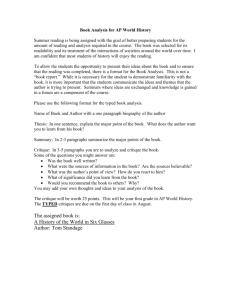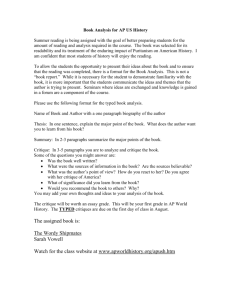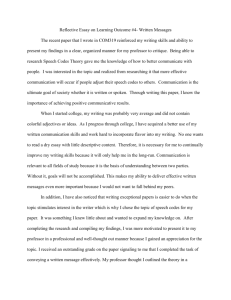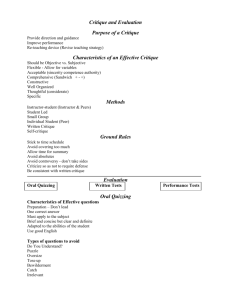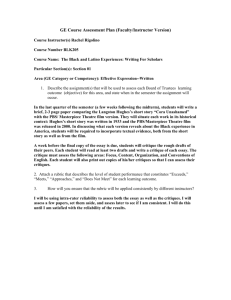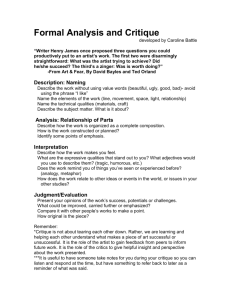COCG 164 - Ocean County College
advertisement
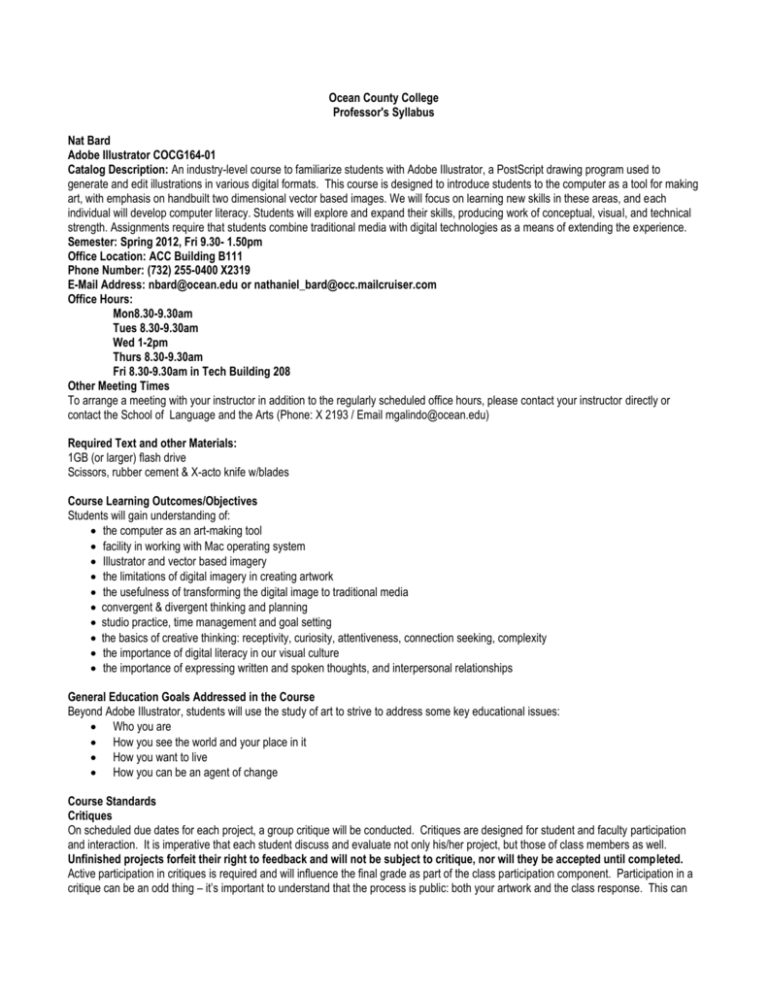
Ocean County College Professor's Syllabus Nat Bard Adobe Illustrator COCG164-01 Catalog Description: An industry-level course to familiarize students with Adobe Illustrator, a PostScript drawing program used to generate and edit illustrations in various digital formats. This course is designed to introduce students to the computer as a tool for making art, with emphasis on handbuilt two dimensional vector based images. We will focus on learning new skills in these areas, and each individual will develop computer literacy. Students will explore and expand their skills, producing work of conceptual, visual, and technical strength. Assignments require that students combine traditional media with digital technologies as a means of extending the experience. Semester: Spring 2012, Fri 9.30- 1.50pm Office Location: ACC Building B111 Phone Number: (732) 255-0400 X2319 E-Mail Address: nbard@ocean.edu or nathaniel_bard@occ.mailcruiser.com Office Hours: Mon8.30-9.30am Tues 8.30-9.30am Wed 1-2pm Thurs 8.30-9.30am Fri 8.30-9.30am in Tech Building 208 Other Meeting Times To arrange a meeting with your instructor in addition to the regularly scheduled office hours, please contact your instructor directly or contact the School of Language and the Arts (Phone: X 2193 / Email mgalindo@ocean.edu) Required Text and other Materials: 1GB (or larger) flash drive Scissors, rubber cement & X-acto knife w/blades Course Learning Outcomes/Objectives Students will gain understanding of: the computer as an art-making tool facility in working with Mac operating system Illustrator and vector based imagery the limitations of digital imagery in creating artwork the usefulness of transforming the digital image to traditional media convergent & divergent thinking and planning studio practice, time management and goal setting the basics of creative thinking: receptivity, curiosity, attentiveness, connection seeking, complexity the importance of digital literacy in our visual culture the importance of expressing written and spoken thoughts, and interpersonal relationships General Education Goals Addressed in the Course Beyond Adobe Illustrator, students will use the study of art to strive to address some key educational issues: Who you are How you see the world and your place in it How you want to live How you can be an agent of change Course Standards Critiques On scheduled due dates for each project, a group critique will be conducted. Critiques are designed for student and faculty participation and interaction. It is imperative that each student discuss and evaluate not only his/her project, but those of class members as well. Unfinished projects forfeit their right to feedback and will not be subject to critique, nor will they be accepted until completed. Active participation in critiques is required and will influence the final grade as part of the class participation component. Participation in a critique can be an odd thing – it’s important to understand that the process is public: both your artwork and the class response. This can lead to some awkward moments. Please understand that comments are never personal. If the critique veers towards personal attack, condescension, or nonsense, I will intervene and the speaker forfeits the floor. Even so, you need a thick skin in this course, and it may not be the course for you. If you find yourself uncomfortable during discussions, feel free to slip out and return shortly. Original Work All work submitted for a class must have been made by you, specifically for the course it has been submitted to. A specific project may not be submitted in multiple classes. Submitting work not generated for a specific course constitutes academic dishonesty. The penalty for academic dishonesty is an automatic "F" in the course in which the offense is committed and a report to the Dean. You are prohibited from using any image found online or otherwise in this course – all work must be original and made by you. During class You do not need to ask permission to take a quick break, go to the bathroom or get a drink We will take several official breaks to stay lively Please turn off your cellphone during class – no text messaging Don’t wear headphones – no iPods or other sound devices. This became a real issue last semester! No drawing can come from an online image source. Finding a photo online and copying it is plagiarism. Ban list Online image searches Clichéd images Static, centered compositions Attendance Policy: Your presence is essential in this class for you and for your classmates. As a community of artists, we rely upon each other for feedback and criticism. In addition, time in class is comprised of many important activities: discussion, demonstrations, critique, slide presentations, and work in class, to name just a few. Since it is not possible to replicate this experience outside of class, attendance is mandatory. After four absences, you will fail the course without notification from me. Absences One: yours to enjoy – no action taken. Two: drop of one letter in your final grade. Three: drop of one letter in your final grade. Four: failure for the course. Lateness Policy It is very important that you are on time to class so that we may begin promptly and without interruption. Also, it is important that you not miss any information as it may hinder your ability to complete your projects, or may compromise your ability to assist classmates during critiques and discussions. Lateness is recorded. 2 late arrivals = 1 absence. This means that it is possible to fail this course based upon lateness alone, so please be on time. It’s up to you to compensate for any parking issues. Once the door to the studio is closed, you’re late. Withdrawal policy A student may withdraw or be withdrawn from a course for the Spring 2012 semester and the Spring Quickterm 2012 until Monday, April 2, 2012 with the instructor assigning a grade of “W” and providing the last date of attendance. If a student stops attending or is administratively withdrawn after this date, an “F” will be assigned. The Add/Drop/Withdrawal Form can be obtained from the Registration and Records Office on the first floor of the Administration Building. Return the completed and signed form to the Registration and Records Office. The absolute last day a withdrawal will be accepted is Monday, April 2, 2012. Grading scale Criteria for Grading In this class you will not be graded on how “good” your work is versus the person’s next to you. You are graded on how much you learn, your effort and how much you challenge yourself. Your final grade will be based on the following: Results of assignments: you will be graded on formal issues, degree of difficulty, and quality of work. Effort, craftsmanship, risk taking and experimentation all factor in to the grade of each project. Attendance: Too much material is covered each week to allow unexcused absences. Don’t miss class if you can help it—it can cost you. Performance/participation: Speaking during class discussions and critiques, consistently working during studio time. All projects must be completed in order to receive an A in this course. Projects that are not completed on time will not be eligible for an A grade. You have the option of re-working a project if you were unhappy with critique comments or a grade, but you cannot replace points you lost due to lateness. You can receive updates on your grades by request at any time during the semester. Assignments Projects – Seven projects will begin in class, but will be completed outside of class studio time. Overall you will be completing 7 projects (30 points each) and 6 studies (10 points each). Divergent Drawing For this semester long drawing, you'll be crafting a response to the title Making Sense of the 5 Senses. This is wide open, and should be interpreted freely. Keep your eye on the announcements section of OceanCruiser as I'll post links to video & radio, as well as various readings - all of these relate to the senses, and should provide food for thought. I've opened a forum in the Message Board section for you to chat online at any time -check in to see what others have added, and how people react & respond. Gather your thoughts & ideas in your sketchbook and be prepared to critique & discuss your first draft during our mid term critique on March 23. The finished drawing is due on our last class, May 11. Extra credit Students have the option of extra credit to bolster project grades, and can choose from the following list: 1. Matinee Film Series – Wed Feb 8, March 14, April 11 from 1-3, Thurs Feb 16 & 23, March 22 & 29, April 19 &26 7-9pm in room B112 - for each film attended– 3points 2. Student trip to a New York museum (the Met or MoMA)– 6 points 3. Student trip to a gallery – Noyes Museum or First Friday in Philadelphia - 6 points 4. Participation in the insite student project - 3 points Grading Scale – 260 possible points A 90-100% Overall excellence, exceeds expectation. Outstanding: work demonstrating significant growth; participation in class; critical thinking; depth of inquiry; willing to take risks and explore challenging solutions. Your work generates discussion, and needs no improvement (truly rare). B 80-89% Impressive but not excellent. Excellent work, but has rough edges, raises questions in critique, and could use polishing. C 70-79% Overall average: work as expected at this level but without demonstrable growth. Work accomplished all requirements, but without grace, significant thought or power – student did what was asked, and no more. The equivalent of doing just enough to avoid being fired from a job – very common. D 60-69% Overall below average: work below that expected at this level and without demonstrable growth. Below average: work fails to accomplish basic requirements, displays a lack of effort and commitment, generally lackluster. F 59% and below Failure to complete and submit project Statement of Plagiarism: Students should refer to the student handbook and review Policy #5180. Consider the previous description of online image usage as an example of plagiarism. Statement about Civility Disruptive behavior Studio classes differ from lecture classes in several key ways, but the most striking is the use of time and interaction between students and faculty. That dynamic, paired with the very public discussion and critique of student artwork mentioned earlier can lead to difficult moments. If such a moment becomes disruptive – behavior ranging from cutting off peers or faculty to verbal challenges of curricula or other explosions – class will be dismissed. The perpetrator of disruptive behavior will speak with me immediately, which serves as a first warning. The second instance of disruptive behavior will earn that student an early dismissal to meet with the Dean of the School of Arts and Language, and said student cannot return to class again without permission from the Dean. There will be no third offense. [See www.ocean.edu/civility.htm] Evaluation of student: As described above, there will be 7 projects (30 points each) and 6 studies (10 points each) for a total of 260 points. All projects are subject to improvement and re-grading. Campus Resources and Services: Tutoring is available [a] in the Writing Center for writing assignments in all subject areas, not just English courses, and [b] in the Mathematics Tutoring Center. Tutoring information for all other subjects can be found on the Tutoring page on the college website. In addition, Study Strategy Seminars are scheduled each week and are posted on the college website under “Academics.” More information on college services can be found by using the A-Z index on the college website (for example, under “T” for Tutoring or under “S” for Study Strategy Seminars). Statement of Accommodation: If there is any student in this class who has special needs because of learning disabilities or other kinds of disabilities, please feel free to come and discuss this with me or a staff member in the Center for Academic Excellence. Disclaimer: Individual faculty members may make reasonable changes to this course outline exclusive of course requirements, course calendar, and grading procedures. All individuals should not assume that anything received, sent, or stored in this course or in any course is private. Students’ written work, assignments, and test results may be used anonymously for college assessment purposes. Course content, support materials, and communications (including chats, discussions, emails, and any other forms of communication) may be used for quality assurance purposes by authorized college administrators. Important Notes Ocean Cruiser is the official email communication for students at OCC (firstname_lastname@occ.mailcruiser.com) Failure to pay for this course may result in your being dropped for non-payment. Course Outline: Week 1 Week 2 Week 3 Week 4 Week 5 Week 6 Week 7 Week 8 Week 9 Week 10 Week 11 Week 12 Week 13 Week 14 Week 15 Week 16 Topics Intro to Mac Avoiding boring thinking Cut paper collage – pleasant surprise Illustrator basics – shape only drawing Still life arrangement Triptych Triptych Text tools Text tools & hand lettering Self portrait – real & altered No class – spring break 1st draft critique – Making Sense of the 5 Senses Self portrait – real & altered Adding texture – disguising the vector look Adding texture – disguising the vector look From digital to the real – cut paper Cut paper Collaborative illustration Collaborative illustration Final crit
